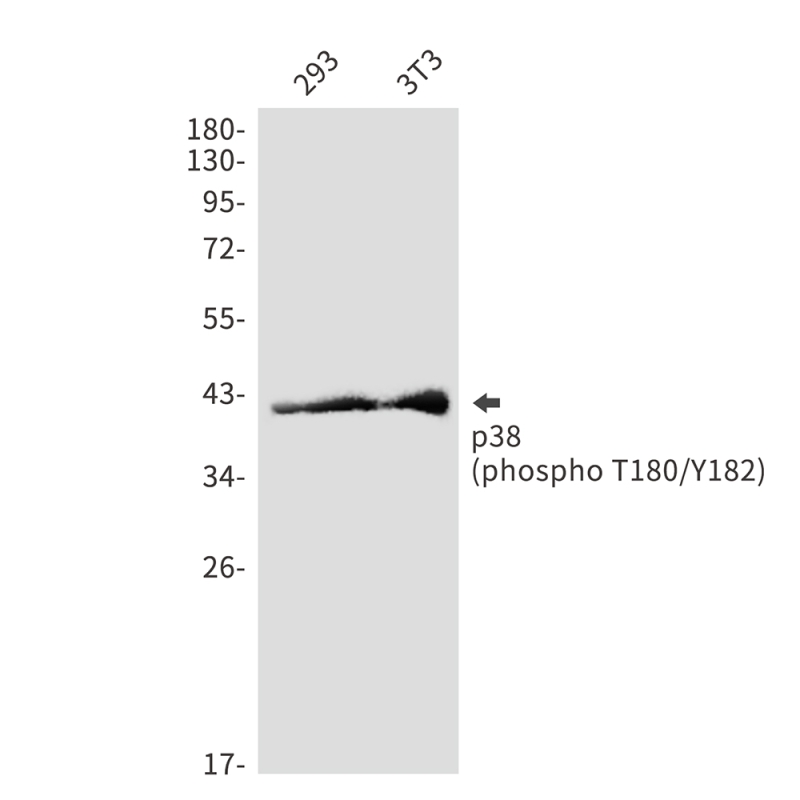
| WB | 咨询技术 | Human,Mouse,Rat |
| IF | 咨询技术 | Human,Mouse,Rat |
| IHC | 咨询技术 | Human,Mouse,Rat |
| ICC | 技术咨询 | Human,Mouse,Rat |
| FCM | 咨询技术 | Human,Mouse,Rat |
| Elisa | 咨询技术 | Human,Mouse,Rat |
| Aliases | MAPK14; CSBP; CSBP1; CSBP2; CSPB1; MXI2; SAPK2A; Mitogen-activated protein kinase 14; MAP kinase 14; MAPK 14; Cytokine suppressive anti-inflammatory drug-binding protein; CSAID-binding protein; CSBP; MAP kinase MXI2; MAX-interacting protein |
| Entrez GeneID | 1432 |
| WB Predicted band size | Calculated MW: 41 kDa; Observed MW: 41 kDa |
| Host/Isotype | Rabbit IgG |
| Antibody Type | Primary antibody |
| Storage | Store at 4°C short term. Aliquot and store at -20°C long term. Avoid freeze/thaw cycles. |
| Species Reactivity | Human,Mouse |
| Immunogen | A synthetic phosphopeptide corresponding to residues surrounding Thr180/Tyr182 of human p38 |
| Formulation | Purified antibody in TBS with 0.05% sodium azide,0.05%BSA and 50% glycerol. |
+ +
1. **"Inhibition of p38 MAPK by glucocorticoids via induction of MAPK phosphatase-1 enhances nontypeable Haemophilus influenzae-induced expression of toll-like receptor 2"**
*Authors: Wang X, et al.*
*摘要*: 该研究使用Phospho-p38 (Thr180/Tyr182)抗体通过Western blot检测糖皮质激素调控p38 MAPK磷酸化水平,揭示其在细菌感染中的抗炎机制。
2. **"Role of p38 MAP Kinase in Cellular Stress Responses"**
*Authors: Cuenda A, Cohen P.*
*摘要*: 综述p38 MAPK的激活机制(Thr180/Tyr182双磷酸化)及其在炎症、凋亡中的作用,提及该抗体用于检测应激诱导的p38活化。
3. **"A selective inhibitor of p38 MAP kinase downregulates cytokine release induced by amyloid-beta peptide in microglia"**
*Authors: Koistinaho M, et al.*
*摘要*: 通过Phospho-p38抗体验证p38活化在小胶质细胞炎症反应中的关键性,证明抑制p38可减少阿尔茨海默病相关神经炎症。
4. **"Differential activation of p38 MAPK isoforms by osmotic shock and lipopolysaccharide in human astrocytes"**
*Authors: Lee JC, et al.*
*摘要*: 利用Phospho-p38 (Thr180/Tyr182)抗体比较渗透压应激和LPS对星形胶质细胞中p38不同亚型的激活差异,揭示信号通路的特异性调控。
*注:以上文献为示例,实际引用时需核对期刊、年份及具体实验细节。建议通过PubMed或Google Scholar以“Phospho-p38 (Thr180/Tyr182) antibody”为关键词检索最新应用文献。*
Phospho-p38 (Thr180/Tyr182) antibodies are essential tools for studying the activation status of p38 mitogen-activated protein kinase (MAPK), a key signaling molecule involved in cellular responses to stress, inflammation, and apoptosis. The p38 MAPK pathway is activated by diverse stimuli, including cytokines, UV radiation, and osmotic stress. Its activation requires dual phosphorylation at conserved threonine (Thr180) and tyrosine (Tyr182) residues within the activation loop, mediated by upstream MAPK kinases (MKK3/6). This phosphorylation induces conformational changes, enabling p38 to phosphorylate downstream targets like transcription factors (e.g., ATF-2. CREB) and kinases (e.g., MAPKAPK2), which regulate gene expression, cell survival, and inflammatory responses.
Phospho-specific antibodies targeting Thr180/Tyr182 allow researchers to distinguish activated p38 from its inactive form, providing insights into pathway dynamics in physiological and pathological contexts. These antibodies are widely used in techniques like Western blotting, immunofluorescence, and flow cytometry to study p38 activation in diseases such as cancer, autoimmune disorders, and neurodegenerative conditions. They also aid in evaluating drug efficacy, as p38 inhibitors are explored for therapeutic applications. Validation of these antibodies includes testing in knockout models or with phosphatase-treated lysates to confirm specificity. Proper controls are critical, as cross-reactivity with other phosphorylated MAPKs (e.g., JNK, ERK) may occur. Overall, these antibodies are pivotal for dissecting p38 MAPK signaling mechanisms in health and disease.
×